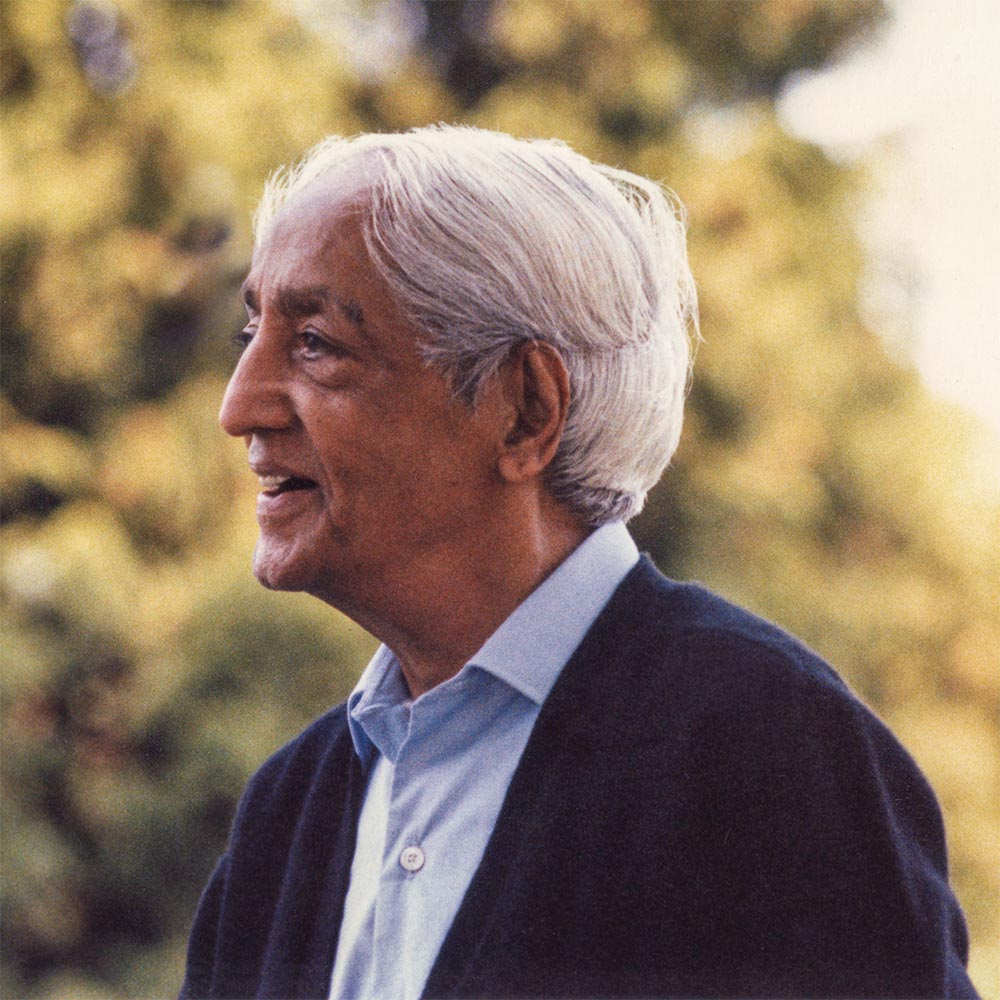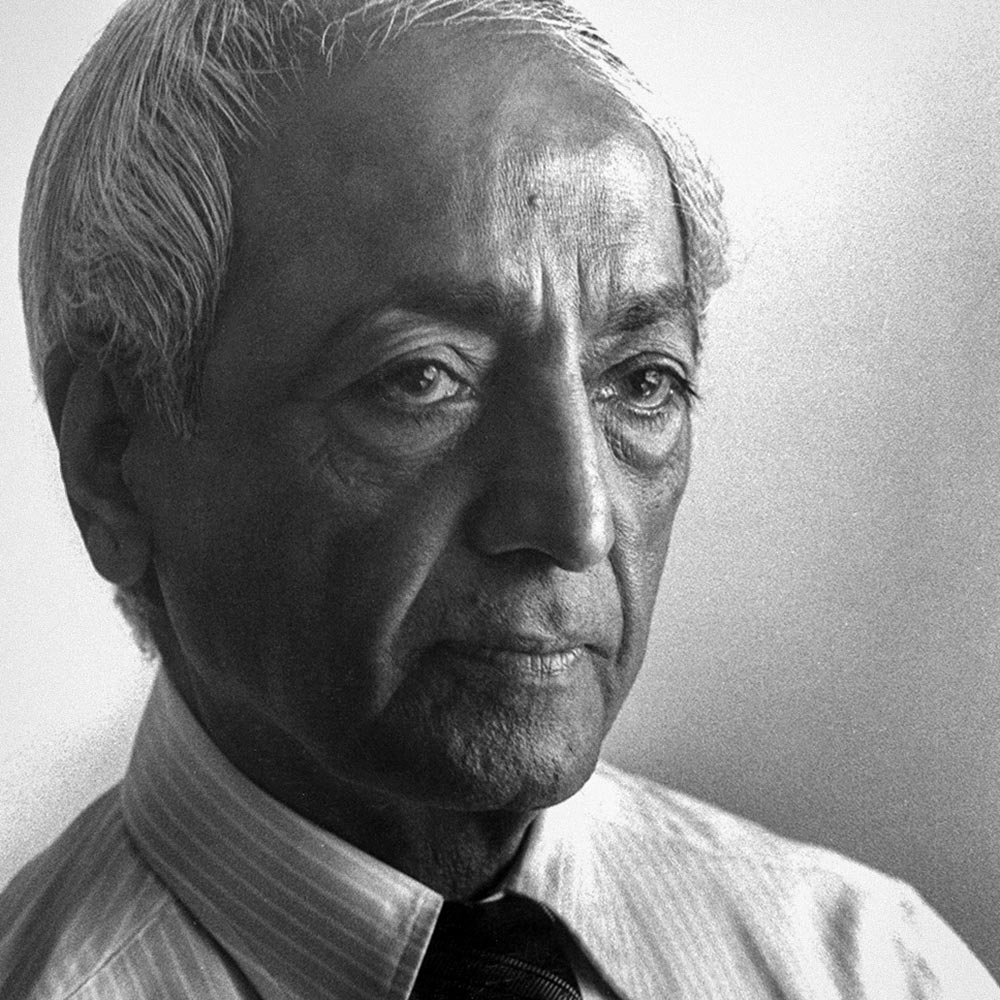Human beings have lost touch with nature. We consider nature as something that can be exploited.
Krishnamurti, Fire in the Mind
Read More
Questioner: I think one can actually say that there is a looking in which the seer does not exist. But I don’t want to start there. That’s why I’m coming to you as a beginner, a beginner who says, ‘I look with my eyes’. I want to start from there.
K: I would reply to that: Do you only look? Or do you also hear – hear the sound of the whisper among the deep shadows of the trees, the sound of the breeze and of running water? My question is: Do you listen, see and feel?
Q: Sir, if you are seeing, listening, feeling, then it is a state where everything exists. But I don’t know anything about that. So, I would like to approach it from the point of view of a beginner rather than of any other.
K: Would you agree that human beings have lost touch with nature?
PJ: Yes, completely; because when they see, their eyes move over. They never look directly. They never look – period. They consider it too trivial.
K: That’s just it. They consider viewing nature as something trivial. They consider nature as something that can be exploited.
Why is it that nature and its extraordinary vitality and beauty play so little a part in our lives?
Krishnamurti, How to Find Peace
Read More
In our greed, in our self-expansive process, in our drive for power, position and authority, we are devastating the earth.
Krishnamurti, How to Find Peace
Read More
It is strange how human beings desecrate nature with their killing, noise and vulgarity.
Krishnamurti, Meeting Life
Read More
Is the function of the brain to go on living like this, acquiring great knowledge and using that knowledge to destroy each other, the earth and nature?
Krishnamurti, Where Can Peace Be Found?
Read More
We are killing all over the world. Those marvellous, great animals of the sea, the whales, are killed by the million, and the tiger and so many other animals are now becoming endangered species. Man is the only animal that is to be dreaded.
Read More
To worship nature is an escape from ourselves. We are always using nature, either as an escape or for utilitarian ends – we never actually stop and love the earth or the things of the earth.
Krishnamurti, What Are You Doing With Your Life?
Read More
When we lose contact with nature, we lose contact with each other.
Krishnamurti, The Whole Movement of Life Is Learning
Read More
If you hurt nature, you are hurting yourself.
Krishnamurti, The Whole Movement of Life Is Learning
Read More
All life is relationship – with others, with nature, with the universe and with the little flower in the field.
Krishnamurti, Where Can Peace Be Found?
Read More
Healing of the mind gradually takes place if you are with nature, with that orange on the tree and the blade of grass that pushes through cement, with the hills hidden by the clouds.
Read More
If I have not established a right relationship with nature or with another person, how can I ever establish the right relationship with the immensity of the universe?
Krishnamurti, Fire in the Mind
Read More
A religious mind has beauty, which is not mere appreciation of nature, the lovely mountains and the roaring stream, but quite a different sense of beauty; and with it goes love.
Krishnamurti, Meeting Life
Read More
Real peace is not only in ourselves but with our neighbours and with the world, peace with the environment, the ecology, peace that is deep-rooted, unshakeable, not a superficial, passing thing but peace of timeless depth.
Krishnamurti, Can Conflict End?
Read More
All the grass of the world is in one blade.
Read More
These quotes only touch on the many subjects Krishnamurti inquired into during his lifetime. His timeless and universal teachings can be explored using the Index of Topics where you will find texts, audio and video related on many themes. Another option is to browse our selection of curated articles or more short quotes. Krishnamurti’s reply when asked what lies at the heart of his teachings can be found here. Many Krishnamurti books are available, a selection of which can be explored here. To find out more about Krishnamurti’s life, please see our introduction and the biography. We also host a weekly podcast, and offer free downloads. Please visit our YouTube channel for hundreds of specially selected shorter clips. Below, you can learn more about Krishnamurti and our charity which he founded in 1968.

Who Was Krishnamurti?
J. Krishnamurti (1895-1986) is widely regarded as one of the greatest thinkers and religious teachers of all time. He spoke throughout the world to large audiences and to individuals, including writers, scientists, philosophers and educators, about the need for a radical change in mankind. Referring to himself, Krishnamurti said:
He is acting as a mirror for you to look into. That mirror is not an authority. It has no authority, it’s just a mirror. And when you see it clearly, understand what you see in that mirror, then throw it away, break it up.
Krishnamurti was concerned with all humanity and held no nationality or belief and belonged to no particular group or culture. In the latter part of his life, along with continuing to give public talks, he travelled mainly between the schools he had founded in India, Britain and the United States, which educate for the total understanding of man and the art of living. He stressed that only this profound understanding can create a new generation that will live in peace.
Krishnamurti reminded his listeners again and again that we are all human beings first and not Hindus, Muslims or Christians, that we are like the rest of humanity and are not different from one another. He asked that we tread lightly on this earth without destroying ourselves or the environment. He communicated to his listeners a deep sense of respect for nature. His teachings transcend man-made belief systems, nationalistic sentiment and sectarianism. At the same time, they give new meaning and direction to mankind’s search for truth. His teaching is timeless, universal and increasingly relevant to the modern age.
I am nobody. It is as simple as that. I am nobody. But what is important is who you are, what you are.
Krishnamurti
Krishnamurti spoke not as a guru but as a friend. His talks and discussions are based not on tradition-based knowledge but on his own insights into the human mind and his vision of the sacred, so he always communicated a sense of freshness and directness, although the essence of his message remained unchanged over the years. When Krishnamurti addressed large audiences, people felt that he was talking to each of them personally, addressing their own particular problem. In his private interviews, he was a compassionate teacher, listening attentively to those who came to him in sorrow, and encouraging them to heal themselves through their own understanding. Religious scholars found that his words threw new light on traditional concepts. Krishnamurti took on the challenge of modern scientists and psychologists and went with them step by step, discussing their theories and sometimes enabling them to discern the limitations of their theories.
Krishnamurti left a large body of literature in the form of public talks, writings, discussions with teachers and students, scientists, psychologists and religious figures, conversations with individuals, television and radio interviews, and letters. Many of these have been published as books, in over 60 languages, along with hundreds of audio and video recordings.

The Krishnamurti Foundation
Established in 1968 as a registered charity, and located at The Krishnamurti Centre, Krishnamurti Foundation Trust exists to preserve and make available Krishnamurti’s teachings.
The Foundation serves a global audience by providing worldwide free access to Krishnamurti videos, audio and texts to those who may be interested in pursuing an understanding of Krishnamurti’s work in their own lives.
In describing his intentions for the Foundations, Krishnamurti said:
The Foundations will see to it that these teachings are kept whole, are not distorted, are not made corrupt.

